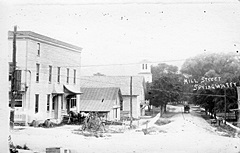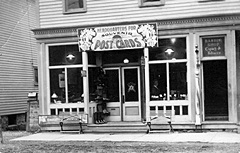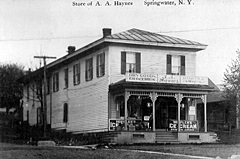
Welcome to Hemlock and Canadice Lakes!
Barns Businesses Cemeteries Churches Clinton & Sullivan Columns Communities Documents Events Time Line Fairs & Festivals Farm & Garden Hiking Homesteads Lake Cottages Lake Scenes Landscapes Library News Articles Old Maps Old Roads & Bridges Organizations People Photo Gallery Podcasts Railroad Reservoir Schools State Forest Veterans Videos
|
“Thoughts by a Country Woman” by Clara Mack |
|
|
Father’s Back Room By Clara Mack 1950
|
||
|
1 Marvin building circa 1930. Was located at the four corners in Springwater NY. Everybody in our community knows that Father has sold his meat market to Reginald Haynes. Now the long glass showcase, Father’s pride and joy, has been moved to the Haynes store, where it looks even longer and whiter and shinier. The new place of business is already established and the townsfolks are already becoming accustomed to the new order. But it is the old meat market that I would like to talk about. Ever since I can remember there has been a butcher shop in the Marvin block on the west side of Main street. From time to time the business has changed hands, but this is the first time in years that the entire stock has been moved out. And in the rear of the place there has always been a little 6x10, dimly lighted, unsightly back room. Father sometimes referred to it as his office or his settin’ room or his whittlin’ room. The north end was just a storage compartment where Father kept empty packing cases and rolls of wrapping paper and twine, and oyster pails and shallow cardboard dishes used in the sale of sausage and hamberger. But I never noticed the north end of the back room. Thinking back, I can scarcely remember what was there. You see, Father always sat in the south end. There he had one of the smallest stoves I ever saw (he put the pea coal in from the top with a shovel that held about a pint), a square rickety stand where the radio sat and where the magazines were sometimes piled a foot high, one wicker porch chair, the back padded with old newspapers tied on with string, a square wooden box half-full of coal ashes well wetted with rich, brown tobacco juice, and a nail keg turned buttom-side up. That was the extra chair. Its surface was worn as smooth as any seat in any little red schoolhouse, worn smooth by Father’s customers and friends and relatives who have sat on the keg for a few minutes to warm their feet by the little stove and pass the time of day. The floor was always covered with fine shavings that Father had whittled with his jackknife. |
||
|
2 Grover’s barber shop and the telephone office circa 1930. Sometimes I have been there alone while Father waited on trade. I could hear Don Robinson’s carefree laugh as he walked across the hardware store just back of the whittling room, and the sound of the customer out in front as he asked the price of pork chops, the pleasant voice of the telephone operator saying “Number please” from the north side, and the hearty, boisterous guffaws of the fellows in Grover’s barber shop beyond the south partition. Then when Father came back we’d make talky-talk. Being a serious man, with a mind much concerned over the state of the nation, Father is inclined to speak of affairs of the day. “Have you read Mark Sullivan?” he would ask me. And I, a bit flustered, often had to admit that I hadn’t time to read more than the headlines. “Well, now, before that paper gets destroyed, you read page eight. And while you’re at it you better see what Forbes said on the editorial page,” he would tell me. Then from the overburdened table in the corner he wold produce magazines with many articles marked for me to read. There in the narrow back room we talked of farming. Sometimes we talked of the King and Queen of England, or taxes, or the Brown Bomber, or the price of beef, or what becomes of money after you get it. Oftentimes Father would remind me to listen to the radio version of Town Hall. Sometimes we took Madam Perkins apart and didn’t put her back together again, sometimes we laid Hitler out in lavender, and sometimes we mourned because the young kids in our town seemed to be going to the devil. Truely, I shall miss Father’s whittling room. |
||
|
3 The Haynes Building on the left circa 1920. Located at the four corners in Springwater NY. But that isn’t all. The head man and I will miss the good soup bones and pound packages of limburger and plate pieces that Father dispensed with such generosity. “What’s Hube doing today?” he would ask me. “Plowing the east lot,” I might answer. “Then he needs a good steak,” Father would declare, and proceed to cut off two choice T-bones. If all the meat Father has given away in the past ten years was laid end to end, it would reach from here to Broadway at Forty-Second street, and if all the good advice he has given me from his willow chair in the narrow whittling room was printed, it would make a volume thicker than the Agriculture Year Book.
|
||
|
Editor’s Note: Clara Mack wrote a column for the Wayland Register between 1935 and 1950. She published her articles in a book called “Thoughts by a Country Woman” in 1950. In 1938 she won second prize in a national contest for the selection of the best country newspaper correspondent for the year. |
||


